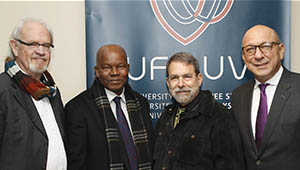Latest News Archive
Please select Category, Year, and then Month to display items
12 October 2020
|
Story Arina Engelbrecht
|
Photo Supplied
 Arina Engelbrecht from Organisational Development and Employee Well-being believes physical activity has a number of benefits for one’s health, including stress relief.
Arina Engelbrecht from Organisational Development and Employee Well-being believes physical activity has a number of benefits for one’s health, including stress relief.
Being physically active plays a big role in preventing the development of mental-health problems and in improving the quality of life of people experiencing mental-health problems.
Treatment for depression
Physical activity can be an alternative treatment for depression. It can be used as a stand-alone treatment or in combination with medication and/or psychological therapy. It promotes all kinds of changes in the brain, including neural growth, reduced inflammation, and new activity patterns are formed that promote feelings of calm and well-being. It releases endorphins – powerful chemicals in the brain that energise your spirit and make you feel good.
Physical activity can be very effective in relieving stress. Research in adults has found that physically active individuals tend to have lower stress levels compared to individuals who are less active. It also leads to improved sleep. When a person sleeps better and feels more rested, overall quality of life improves. They cope better with daily life stressors.
Reduce Alzheimer's risk
Regular physical activity can reduce your risk of developing Alzheimer's disease by up to 50%. It can also slow down further deterioration in those who have already started to develop cognitive problems. It stimulates the brain’s ability to maintain old connections as well as to make new ones.
A study asked people to rate their mood immediately after periods of physical activity (e.g. going for a walk/run, cycling, doing housework) and periods of inactivity (e.g. reading a book or watching television). Researchers found that participants felt more content, more awake, and calmer after being physically active compared to after periods of inactivity.
In conclusion, people who are physically active feel a sense of well-being, feel more energetic throughout the day, sleep better at night, have sharper memories, and feel more relaxed and positive about themselves and their lives.
“Being physically active not only changes your body, it changes your mind,
attitude, and your mood.” – Arina Engelbrecht
Trevor Manuel and Max du Preez among the recipients of honorary doctorates at UFS graduation
2016-07-02
 The UFS awarded four honorary doctorates
The UFS awarded four honorary doctorates
at its Winter Graduation ceremonies.
The recipients are from left Max du Preez,
Dr Reuel Jethro Khoza, Prof Joel Samoff
and Trevor Manuel at the UFS Chancellor’s
Dinner on 30 June 2016. Photo: Johan Roux
He is excited about the young minds he saw and interacted with at the graduation ceremony of the University of the Free State (UFS). This is what Max du Preez, one of South Africa’s leading journalists and political analysts, said after receiving an honorary doctorate.
According to Du Preez (Humanities), he was inspired by the Winter Graduation ceremony on 30 June 2016 in the Callie Human Centre on the Bloemfontein Campus. He is happy to finally also call the UFS his alma mater. He grew up in Kroonstad and is a true Free Stater, but previously graduated at the Stellenbosch University.
The UFS awarded four honorary doctorates – the others to Prof Joel Samoff (Humanities), Trevor Manuel and Dr Reuel Jethro Khoza (both Economic and Management Sciences) – and two Chancellor’s medals at the morning ceremony on 30 June 2016. Chancellor’s medals were awarded to Antony Osler and Marguerite van der Merwe (née Osler).
Manuel impressed by amount of soul
At the Chancellor’s Dinner, which was held in the Centenary Complex on the Bloemfontein Campus on 30 June 2016, Du Preez said he feels honoured. He said South Africans must embrace the diversity of the country, and the UFS is a good example. “If the University of the Free State can make it, South Africa can make it.”
Manuel, a former South African Finance Minister, said he is honoured by the amount of soul he experienced from Dr Khotso Mokhele, UFS Chancellor, and Prof Jonathan Jansen, Vice-Chancellor and Rector of the UFS. “We cannot tolerate what is wrong (in the country) and need to push the boundaries of what is right,” he said.
UFS stands out regarding understanding
Dr Khoza, a distinguished thinker and businessman, also thanked the UFS at the Chancellor’s Dinner. “We shall strive to be known less for what we say, but rather more for what we do,” he said about the country.
According to Prof Samoff, Professor in Africa Studies at Stanford University (USA), “South Africa has committed itself to building a democratic, non-racist, and non-sexist society”. “Where the University of the Free State stands out, is in its understanding that societal change – ‘transformation’, to use the current terminology – is not an outcome, but a process. A difficult process.”
Media Enquiries
Contact person: Lacea Loader (Director: Communication and Brand Management)
Tel: +27(0)51 401 3422/2707 or +27(0)83 645 2454
Email: news@ufs.ac.za | loaderl@ufs.ac.za
Fax: +27(0)51 444 6393